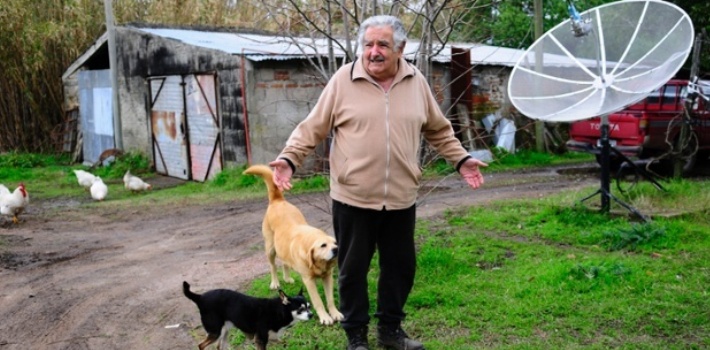
EspañolJosé “Pepe” Mujica, Uruguay’s outgoing president, has become a worldwide sensation.
He’s admired for several reasons: he lives in the countryside in a rather humble house, and the international media have labeled him “the world’s poorest president.” But the most important fact, often repeated by Mujica himself, is that he donated around 90 percent of his former presidential salary to charitable causes.
In May 2012, Spanish daily El Mundo wrote:
[Mujica] donates 90 percent of his US$12,500 salary to social relief funds. Every month, “Pepe” Mujica gets URU$250,000 for his post as president and commander in chief, but he only keeps 20,000 for himself. The rest he distributes to NGOs that foster home ownership and to the Raúl Sendic Fund, a program that supports small businesses, managed by his political faction the Movement of Popular Participation (MPP). He tells anyone who will listen that “I make do with that amount, and I have to because there are many Uruguayans who live with much less.”
He says his old US$1,945 Volkswagen Beetle is his sole possession. According to the sworn statement turned in to the Transparency and Public Ethics Board, Mujica only owns that car, while the farm he lives on is owned by his wife, Senator [Lucía] Topolansky, who also donates part of her salary.
Mujica also boasts of playing a role as mediator in various long-standing conflicts, such as US negotiations with Cuba, and the FARC peace talks with the Colombian government.
A government-supporting Uruguayan newspaper recently wrote: “President José Mujica played a key role in the process that led to the normalization of relations between the United States and Cuba.”
Mujica himself said that “Uruguay contributed in its small way so that United States and Cuba put behind 53 years of differences … We have tried to help the thaw, faithful to our principles … Uruguay’s diplomatic attitude is to help diminish tensions, and if possible, to eliminate them.”
Regarding the FARC, Mujica told El Mundo in an interview two weeks ago that he would soon travel to Cuba to meet the Marxist guerrilla group’s leaders, saying “the negotiations are at a ‘tricky’ moment.”
“For me the most important thing is to assist, to lend a hand. If I can help in any way, I will help anyone. At the Colombian president’s request, now I have to go and discuss something with the FARC leadership. I take nothing out of it personally, but contributing to peace in Colombia helps. So my duty is to be open, selfless, and give positive support,” said Mujica, now a backbench senator for the MPP.
But all those “selfless” statements must be considered within the context of Mujica’s 2014 nomination for the Nobel Peace Prize. Anyone with a training in marketing can see miles away what he’s going for, and his strategy so far has been very successful.
Mujica’s Charade
However, it is becoming increasingly clear that Mujica’s purported image in such affairs is far from being accurate.
Recently, the Transparency and Public Ethics Board uploaded the former president’s sworn statements, where we can see that between 2012 and 2015 his estate grew 92.2 percent in value. Unfortunately, we cannot calculate how much richer he became during his five years as president (2010-2015), because in his first statement he did not declare a net worth: his property (worth US$188,025) and farming machinery (US$21,237) appeared only in the 2012 statement, when he also decided to include two cars worth US$5,512.
In the most recent document turned in, Mujica reported that the portions of his salary donated while occupying the presidency went exclusively to the ruling Broad Front coalition, and to the government-funded housing project Plan Together. The former is a common practice among Uruguayan politicians, who reach positions of power only to bolster their party’s finances and continue winning elections.
Regarding his claim of catalyzing the end of hostilities between United States and Cuba, an investigation by Reuters reporters Warren Strobel, Matt Spetalnick, and David Adams proved him wrong. The process began back in 2008, when Barack Obama gave a speech at the Miami-based Cuban American National Foundation.
In 2013, after the White House “learned Havana would be willing” to engage, it proposed holding “discreet meetings” that began in Canada the following June, without the knowledge or intervention of the countries’ foreign ministries.
There’s rather too much smoke and mirrors surrounding Mujica’s international stardom.
The secret talks had a lot of ups and downs, but they acquired momentum 1n April 2014. Democratic Senator Patrick Leahy proposed to give “the pope and the Vatican [a role] as intermediaries.” The final agreement materialized on October 2014, after several meetings between US, Cuban, and Vatican authorities.
Mujica’s role in all of this is nowhere to be found in the Reuters report.
As for his alleged involvement in the Colombian peace talks, President Juan Manuel Santos himself proved Mujica to be untruthful. On his Twitter account, Santos completely destroys Mujica’s self-anointed role as mediator.
Bienvenidos los buenos oficios de ExPdte Mujica que como muchos quiere apoyar la paz de Colombia. Sin embargo no lo he nombrado mediador.
— Juan Manuel Santos (@JuanManSantos) April 24, 2015
“I welcome former President Mujica’s goodwill to support peace in Colombia, as many do. However, I have not named him a mediator.”
As we can see, there’s rather too much smoke and mirrors surrounding Mujica’s international stardom. If there’s anything lacking in the former Uruguayan president, it’s genuine humility and selflessness.
Translated by Daniel Duarte. Edited by Laurie Blair.
 Versión Español
Versión Español












